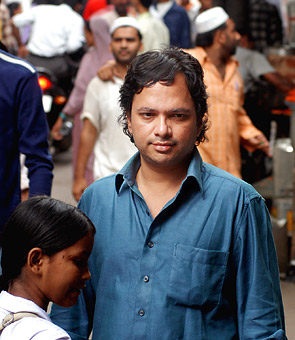
Vikram Chandra
At 916 pages, Vikram Chandra's third novel, Sacred Games, is as much a lifestyle choice as a reading experience. Fortunately, Chandra delivers in an epic thriller about organized crime in India that is being compared to The Godfather. Chandra, 45, spent seven years working on the book. He was paid handsomely for his efforts — an advance of over $1 million. TIME's Andrea Sachs spoke with Chandra:
Andrea Sachs:What made you take on this subject?
Vikram Chandra:When I was growing up in Bombay (now Mumbai), of course crime existed, but you mostly saw and heard about it in the movies. If you were middle class or upper class, then it happened elsewhere. Suddenly it wasn't like that at all. Every morning, you opened the paper, there was "five dead in encounter" here and "so-and-so businessman shot by extortionists" there. In many ways, it started to come very close to home. Geographically, I was within earshot of one famous shootout in the early '90s, which happened in my neighborhood with automatic weapons. Also, my family is connected to the film industry, so I knew people — friends and acquaintances — who were getting shot at. I wanted to understand what was going on.
It sounds as if you have a reporter's instinct.
I'm really driven by curiosity, which, once it gets focused on something, becomes kind of obsessive. My initial thought was to write a 250-, 300-page book, more or less in the traditional format, where you start with a dead body or a crime, and then 300 pages later, everything is explained, and you're done. But as soon as I started pressing at the subject a little, the connections were just so many, and they just sprang up. What I mean by that is the sort of obvious connections between organized crime and politics in Bombay and in the country at large.
When you were researching the book, what kinds of people did you talk with?
Policemen at various levels, not just in Bombay's force but elsewhere. People in the intelligence agencies, very off the record. And people from the other side of the line, the people in the business of organized crime, to whom I made connections through my friends who were crime journalists and on the police force. I was just like any other bourgeois person, living in my little sheltered cocoon, and the underworld seemed far away, at least initially. Now my overwhelming sense of the world is that there is no such thing as the underworld — it is right here with us.
What was it like interviewing folks in the underworld?
The lower-level people, the foot soldiers, especially the ones who were the shooters, were much more wary and difficult to get hold of because they're afraid of being caught by the police and being "encountered," as the Indian slang has it. The newspapers will report the next day that so-and-so gangster was killed in an encounter with the police. What that actually means is that they caught the guy, and they'd question him, and they would kill him, and they'd put a gun in his hand and say it was a shootout. So in India, at least, the word encounter in this context has come to mean a setup, a police killing.
How old were you when you caught the writing bug?
I started writing very, very early. I was a dorky little kid, a nerd with big glasses, and I had this very strong internal life. I started putting these stories on paper when I was 10.
Are you afraid that readers will be scared off by the length of the book?
It was really something that occurred to me as I was writing it. Just in a personal sense as a writer, I was thinking, How long is this damn thing going to go? I have a great affection for long books myself though. (Laughs.) I like reading something that I can disappear into.